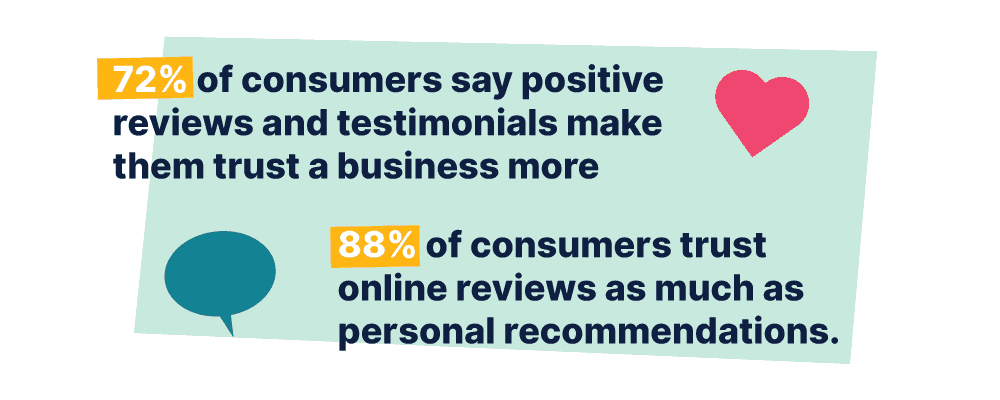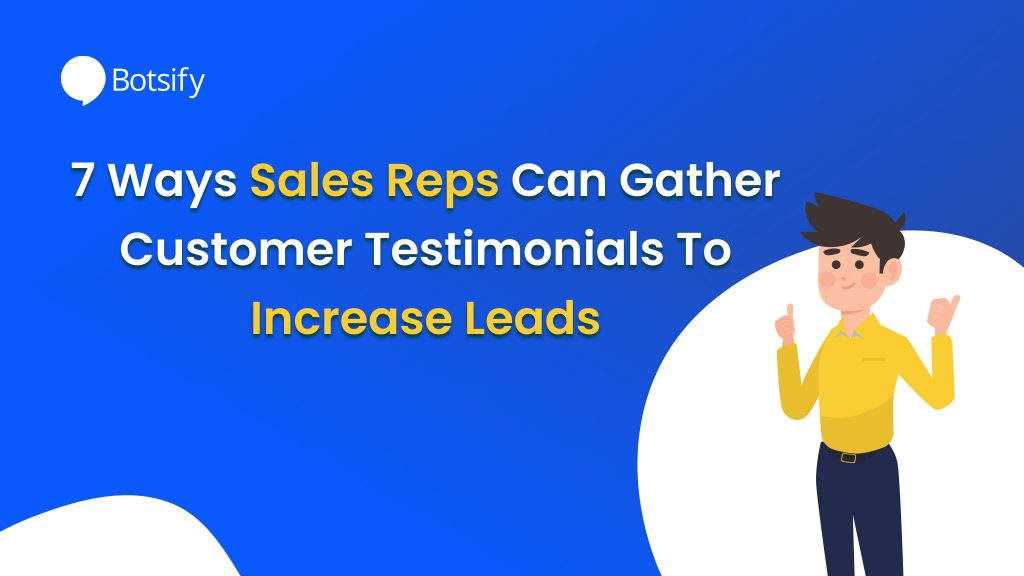Good testimonials can have a huge impact on your sales.
Consumers are so used to social proof that it’s something they’ve come to expect, no matter what they’re buying.
Although social proof plays such a big part in consumer decisions, it can often be difficult to gather high-quality testimonials. It’s not impossible though and with the right processes in place, your sales reps can greatly increase the number of testimonials they collect.
Why Are Testimonials Important for Increasing Leads?
How do people know you’re a trustworthy business that offers good products/services?
They look for social proof – examples of people who have interacted with your business and had a good experience. If you’ve got lots of enthusiastic testimonials, then it’s going to make people feel more comfortable interacting with your business and demonstrate the value of becoming a lead.
On average, consumers read 10 reviews before making a purchase decision, and the same principle applies to becoming a lead. The knowledge that other people have followed a similar path and had positive results is a powerful draw.
A testimonial is a vote of confidence that highlights the value of your product, giving people more reason to become a lead.
How to Gather Customer Testimonials to Increase Leads
Being able to show hundreds of positive testimonials is something many businesses dream of, but how do you gather them? Even though we live in a world where people are accustomed to writing reviews and seeing them on everything they buy (shoppers expect an average of 112 reviews per product when they search online), it’s not always easy to get the testimonials you need.
When people are happy with the product, they don’t have much motivation to write a testimonial (they’ve already got everything they need). On the other hand, if they have a negative experience, then you can bet they’re eager to talk about it.

(source)
This means that your sales reps have to work hard to get testimonials, and there are a number of techniques that can help them do this.
1. Ask the Right Questions
Sometimes, people will give you a testimonial without being prompted.
In reality, though, the majority of people need prompting to leave feedback. They lead busy lives and with many things going on, writing your business a testimonial isn’t the first thing on their mind (no matter how good their experience was).
Testimonials are a form of information (how people liked your product/service), and to get the information you want, you need to ask the right questions. It’s about building a relationship with the customer, and to do this, you’ve got to have a conversation.
Just as you have sales enablement to help your sales reps make sales, you should approach testimonials in a similar way – as a process.
Focus on maintaining the relationship with the customer and asking the right questions to find the information you’re looking for.
2. Get Your Timing Right
When are people most motivated to give you a testimonial?
Imagine you buy a product, and five days later, you get an email request for a testimonial about your experience. The problem is, the shipping takes ten days, so you haven’t gotten your product yet.
In this case, you might be motivated to write a testimonial, but certainly not for the right reasons! Timing is key, so you need to think about when is the best time to ask for this information. Put yourself in the customer’s shoes – at what point are you reaping the benefits of the product and most motivated to write a testimonial?
If you’re too eager and don’t allow people to see the benefits of your product/service, or you wait too long, then you might miss out.
3. Consider the Customer Journey
Your sales reps should have a clear picture of what the customer journey looks like as part of their sales plan.
People tend not to just turn up at your offices wanting to buy something. Instead, they take a journey (often complicated) that involves many different touchpoints. In an ideal scenario, this journey is a continual loop where the customer keeps coming back and using your products and services. The better you understand this customer journey, the easier it is to factor in your testimonial collection.
As we mentioned, timing is extremely important, and your customer journey should give you a good idea of what points in the process you can ask for feedback.
4. Make It Easy for People
People recognize the importance of testimonials for businesses, and they’re generally happy to help out. There’s only so far they’re willing to go for you though, and if you make it difficult for them to give feedback, then they’ll decide it’s not worth the effort.
Think about what happens when you put up barriers to a sale. If you make people fill in one too many forms or take one too many clicks, then it can easily cause them to abandon the cart. This is when they’re motivated to buy something from you, so think about how it works when they feel like they’re doing you a favor by writing you a testimonial.
This means you’ve got to strike a balance between getting the detailed information you want and making the process easy for people. If you put up too many barriers by asking too many questions or complicating the process, then you will get fewer responses.
5. Communicate Through People’s Prefered Channels
Lead generation is omnichannel these days. The process may start on social media, then move to email, involve multiple calls, and finish up on your website.
Different people engage with your business in different ways. Some like to reach you by office phone, others through your website, social media, etc., and the same thing will apply when you’re gathering testimonials.
To make it convenient for people to give you testimonials, you’ve got to allow them to do it through their preferred channel.
Chatbots
Chatbots are an extremely efficient way to communicate with your customers.
They offer a way to automate your testimonial collection but at the same time, add an element of personalization. Sometimes all it takes is a quick message saying “can you tell us about your experience,” and you will get detailed feedback.
Gathering testimonials is about timing, convenience, and asking the right questions, and chatbots can position you perfectly to get all of these elements right.
Email is another excellent way to reach out to customers and ask for testimonials.
With a platform like Mailshake, you can automate your outreach, segmenting your audience so they get the personal communication they need.
Email is an essential part of our day-to-day lives, so we’re accustomed to communicating through this channel. The important thing to remember is you’ve got a brand image to maintain, you don’t want to be associated with spam, so really focus on how you can add value to people’s inboxes.
Social Media
One of the most important parts of marketing and sales is reaching people “where they hang out.” For billions of people, that’s on social media.
An average user spends over 2 hours a day on social media, so it’s a channel people are extremely comfortable on. Making use of your social media platforms, such as Instagram and Facebook, to engage with customers is an excellent way to build your brand. It’s also a good opportunity to ask for testimonials.
Website
Your website is a perfect place to collect testimonials.
The best thing about this is that you own the medium- you’re in charge of how you go about collecting testimonials, allowing you to optimize your testimonial collection as you see fit.
Another way to increase leads is to optimize your website. Search engine optimization (SEO) is the process of improving your website to rank higher on search engines like Google or Bing. Ranking higher makes you more visible to your target audience, increasing your leads and boosting your bottom line.

(source)
Offer People Incentives
You want something from your customers, so what are you offering in return?
There’s nothing wrong with offering an incentive when people take the time to write you a testimonial. If you’re doing it on third-party platforms then you will need to check the terms and conditions, but if it’s strictly for your own use, then this is a legitimate way to get more testimonials.
It shouldn’t ever be a case of incentives for positive reviews, but instead, incentives for unbiased opinions.
Here are some examples of incentives you could use:
- Discounts on future purchases
- Exclusive content
- Early access to future releases
- Workshops
Your incentives don’t have to be huge, they just have to recognize that people are taking time out of their day to give you helpful information.
Overdeliver on Your Promises
When you go out of your way to make something right for the customer, then they’re going to feel inclined to do something for you in return.
If you can exceed expectations, then you will see positive customer feedback. It’s better to underpromise and overdeliver than overdeliver and underpromise, so make sure that you’re managing and exceeding your customers’ expectations.
When you’ve gone out of your way to fix a problem for a customer, then it’s the perfect time to ask for feedback.
Google Ads:
One of the vital stimulators of the accumulation of leads is Google Ads, which allows you to focus on relevant keywords and helps to drive users to your landing page. If everything is in order on your landing page, you will receive very important leads from customers. To collect such kind of leads, there are Google Ads agencies that can help you with precise targeting.
Conclusion
Gathering customer testimonials is all about creating positive interactions and building the relationship with your customers.
If you’re exceeding expectations, asking the right questions at the right time, and making it easy for people to give you feedback, then you will find people are willing to engage with your business and give you testimonials.
It’s not always easy getting positive feedback, but if you treat it as an important business process, then you will see results.
